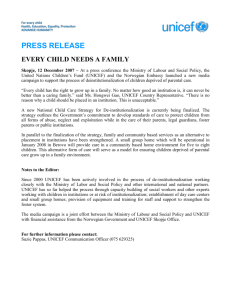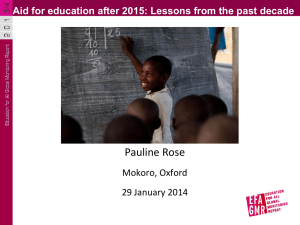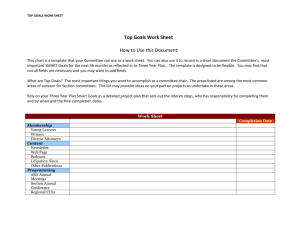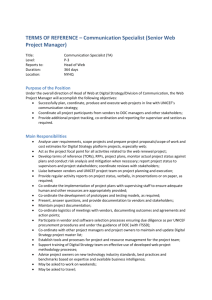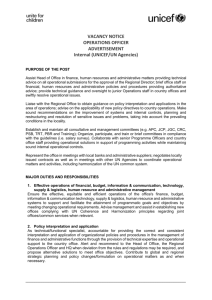click and type title here - IDEAS – International Development
advertisement
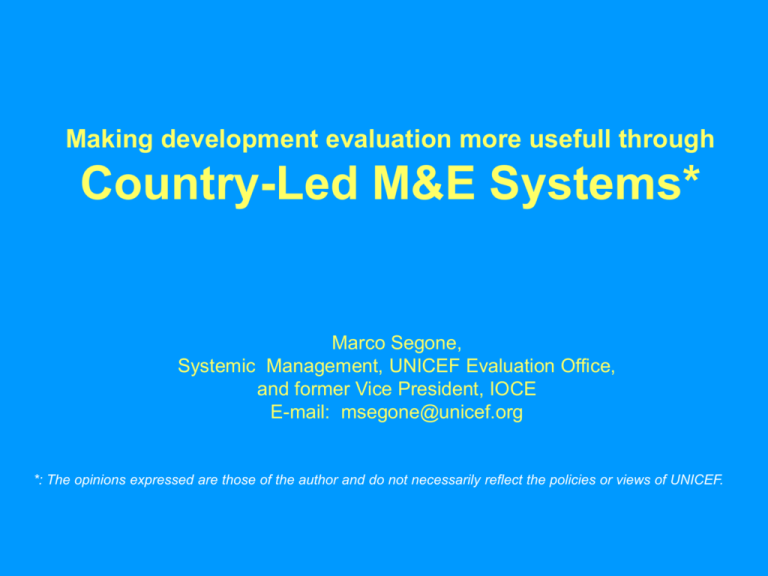
Making development evaluation more usefull through Country-Led M&E Systems* Marco Segone, Systemic Management, UNICEF Evaluation Office, and former Vice President, IOCE E-mail: msegone@unicef.org *: The opinions expressed are those of the author and do not necessarily reflect the policies or views of UNICEF. Based on books published by UNICEF in partnership with key international institutions Webinars are available at www.mymande.org 1 2 A new framework is needed: From … Develop Agencies UNICEF …to Bank UN agency Bilaterals Country UNICEF UN agency CSO A networked partnership National ownership and capacity development: the key ingredients to CLES Managing for results Mutual accounta Harmoni Alignment Ownership zation bility Paris Declaration and AAA on Aid Effectiveness Partner countries exercise effective leadership over their development policies and strategies Paris Declaration Commitment Partner countries exercise leadership in developing and implementing their national development strategies Donors respect partner country leadership and help strengthen their capacity to exercise it. Implications to the M&E Function Strengthen and use country-led M&E systems M&E capacity development … in line with the UN General Assembly … • national Governments have the primary responsibility for coordinating external assistance and evaluating its contribution to national priorities • mandated the United Nations system to promote national ownership and capacity development, and to make system-wide progress in harmonizing evaluation practices UNICEF CLES: what Country (and not donors) leads and owns the evaluation process by determining: what policy or programme will be evaluated (including donors coordination and alignment) what evaluation questions will be asked what methods will be used what analytical approach will be undertaken how findings will be communicated how findings will be used “Country” led? • Not exclusively the Government • Also civil society, including Professional evaluation Evaluation Associations and Networks organizations (from 15 to 118 in a decade) International Organisation for International Development Evaluation Cooperation in Evaluation – IOCE Association – IDEAS (organisational membership) (Individual membership) International Level Regional Level ReLAC Sub-Regional Level IPEN Sub-National Source: Quesnel, 2006 International Development International Organisation for Evaluation Association Cooperation in Evaluation––IDEAS IOCE (Organisational membership) (individual membership) AFrEA AES EES 5 11 36 7 10 Countries Countries Countries Countries ACE 13 National Level Year 2005 Countries AEA CES NWEA,SEA, WREN, SQEP SWEP CLES: Challenges • drive towards ownership is partly externally-driven • longer time frame • perceived risk by partner countries that independent evaluations of donor support may have political and financial consequences • perceived risk by donors/development agencies of weak national capacities and, in some cases, of weak independence of national M&E systems • Priority for donors/development agencies is its own accountability • Shifts in power relationships CLES: potential way forward • Middle income, transition and developing countries cooperation to share good practices and lessons learned • National evaluation organizations fostering national demand (and supply) for monitoring & evaluation • International organizations strengthening national capacities to design and implement national M&E systems through • Knowledge Management System and • facilitating South-South Cooperation We need a mind shift to do things differently... We should always aim at strengthening National ownership and leadership, and not undermining it: • Selecting topics of mutual interest • Implement evaluations jointly with Governments, as a first step towards country-led evaluation • Hiring local experts to the maximum extent possible • Not assuming there are weak evaluation capacities, even if none is immediately apparent • Co-ordinating with other UN agencies and key international stakeholders Invest in the country-led process, even if it may require additional efforts and less control Thank you
